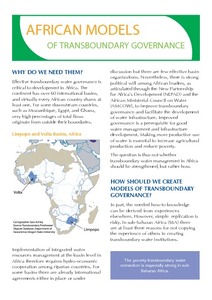Location
The International Water Management Institute (IWMI) is a non-profit, scientific research organization focusing on the sustainable use of water and land resources in developing countries. It is headquartered in Colombo, Sri Lanka, with regional offices across Asia and Africa. IWMI works in partnership with governments, civil society and the private sector to develop scalable agricultural water management solutions that have a real impact on poverty reduction, food security and ecosystem health. IWMI is a member of CGIAR, a global research partnership for a food-secure future.
IWMI’s Mission is to provide evidence-based solutions to sustainably manage water and land resources for food security, people’s livelihoods and the environment.
IWMI’s Vision, as reflected in the Strategy 2014-2018, is ‘a water-secure world’. IWMI targets water and land management challenges faced by poor communities in the developing countries, and through this contributes towards the achievement of the United Nations Millennium Development Goals (MDGs) of reducing poverty and hunger, and maintaining a sustainable environment. These are also the goals of CGIAR.
IWMI works through collaborative research with many partners in the North and South, and targets policymakers, development agencies, individual farmers and private sector organizations.
Resources
Displaying 526 - 530 of 959Managing land and landscapes: a sourcebook
This sourcebook is intended as a ready reference for practitioners (including World Bank stakeholders and clients in borrowing countries as well as Bank project leaders) seeking information on the state of the art about good land management approaches and innovations for investments, and close monitoring for potential scaling up.
Originally Published In: World Bank, Agriculture and Rural Development Department (2008)
Conserving land, protecting water
Following from the Comprehensive Assessment of Water Management in Agriculture project, this book examines the relationships and linkages between land use and water management and social systems. Given that agriculture is the largest economic sector in many developing countries, this volume provides innovative ideas for the prevention of land degradation and for improving the sustainability of food production in the developing world.
A review of management strategies for salt-prone land and water resources in Iran
Approximately half of the irrigated area of Iran falls under different types of salt-affected soils and average yield losses may be as high as 50 percent. Slightly and moderately salt-affected soils are mostly found on the piedmonts at the foot of the Elburz (Alborz) Mountains in the northern part of the country. The soils having severe to extreme salinity are predominantly located in the Central Plateau, the Khuzestan and Southern Coastal Plains and the Caspian Coastal Plain.







